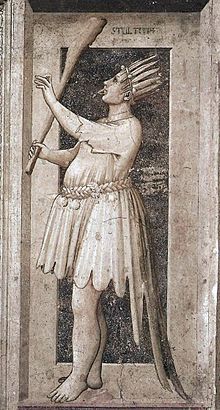Foolishness

Foolishness is the unawareness or lack of social norms which causes offence, annoyance, trouble or injury. Things such as impulsivity and or influences may effect a persons ability to make otherwise reasonable decisions. In this sense, it differs from stupidity, which is the lack of intelligence.[1] An act of foolishness is called folly. Foolish talk is called stultiloquence.
Concept
Andreas Maercker in 1995 defined Foolishness as rigid, dogmatic and inflexible thinking which makes feelings of bitterness and probable annoyance. It is considered as foundation of illusions of grandiosity like omniscience, omnipotence and inviolability. It was studied that people who lack cooperative people and social skills happen to express this lack of empathy, short-term impulsive objectives and related pattern of behavior in workplace.[2]
Book of Proverbs characterizes traits of foolishness.[3] Foolishness and wisdom are contrasted in Paul's letter to the Corinthians. He condemns intellectual arrogance and advocates a humble attitude instead of foolishness, in which it is then possible to learn.[4] Mahatma Gandhi sums up the concept of folly through his Seven Social Sins: Wealth without work; Pleasure without conscience; Knowledge without character; Business without morals; Science without humanity; Religion without sacrifice; Politics without principles.[5]
Plato transvalued reason over foolishness, to him integrity of acceptance of a state itself was beginning of wisdom, he said "He is the wisest man who knows himself to be ill-equipped for the study of wisdom".[6]
See also
- Silliness
- Ridiculous
- Absurdity
- As a dog returns to his vomit, so a fool repeats his folly - specific biblical proverb
- In Praise of Folly
References
- ^ Robert J. Sternberg (2003), "Smart People Are Not Stupid, But They Sure Can Be Foolish", Why Smart People Can Be So Stupid, Yale University Press, pp. 232 et seq., ISBN 9780300101706
- ^ R. J. Sternberg & J. Jordan (Eds.), Handbook of wisdom: Psychological perspectives (2005), pp. 331–352, ISBN 9781139443944.
- ^ Eldon Woodcock, [Proverbs: A Topical Study https://books.google.com/books?id=tbVKAwAAQBAJ&pg=PA20] ISBN 9781579108182
- ^ William Barclay, The Letters to the Corinthians
- ^ The Collected Works of Mahatma Gandhi (electronic edition), Vol. 33, pp. 133-134, ISBN 9788123007359.
- ^ Walter Arnold Kaufmann, Critiqe of religion and philosophy
External links
